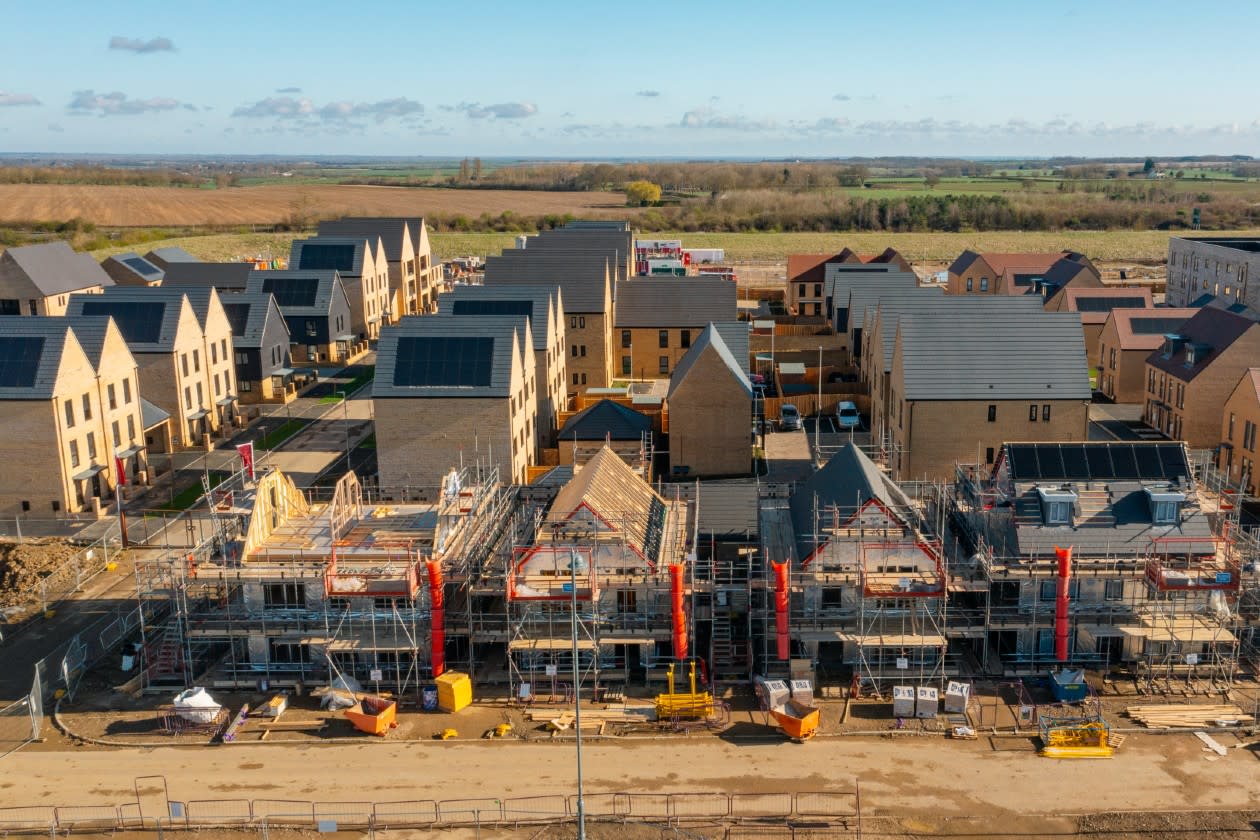Taylor Wimpey’s first-half revenue rose by 9.0% to £1.7bn. This was driven by new home completions rising 11% to 5,264, which was partly offset by a 1.3% decline in average selling prices to £313,000.
Operating profit declined by 11.7% to £161mn, largely due to an unexpected £20mn charge to rectify substandard work by a sub-contractor.
Free cash flow fell from an inflow of £30mn to an outflow of £65mn, largely due to increases in inventories. Net cash fell from £565mn to £327mn.
Average weekly private sales rates have slowed from 0.64 to 0.59 in the four weeks since half year-end.
Full-year operating profit guidance has been lowered by £20mn to £424mn, reflecting the unexpected charge. Net cash is expected to be around £350mn at year end.
An interim dividend of 4.67p per share was announced, down from 4.80p last year.
The shares fell 5.8% in early trading.
Our view
Taylor Wimpey had a decent first half, with new home completions rising in line with expectations. But a £20mn charge related to poor workmanship from a subcontractor saw profits fall at double-digit rates. And markets chose to focus on a slow start to the second half, which saw the shares fall on the day.
With operations focused in the UK, the group should be relatively insulated from the direct impact of tariffs. But if they cause a global economic slowdown, Taylor Wimpey could see demand weaken.
Buyer affordability remains a real struggle. But with UK inflation looking largely under control, there’s cautious optimism that lending rates will creep lower this year. Falling rates are a tailwind for buyers, increasing their purchasing power. A potential homebuyer with a £1500 monthly mortgage budget has over 10% more borrowing capability at 4.0% than 5.0%.
The landbank is a particular strength for Taylor Wimpey, which has a significant number of plots awaiting detailed planning permission. If the new government delivers on its promise to ease planning permission, more supply is likely to come online, and Taylor Wimpey should start to see the benefit.
The balance sheet is in great shape too, arguably one of the strongest in the sector. That provides plenty of cover for the generous prospective dividend yield of 8.9%. But remember, dividend policies can change on a dime. No dividends are guaranteed.
The current dividend policy is linked to asset value rather than earnings. That means investors are more likely to receive a base level of dividend even in a downturn. Given the improving outlook, we’d be keen to see this policy changed to favour a more even split between dividends and share buybacks. This would likely bring more value to shareholders given the group’s trading some way below book value.
Regardless, there are still challenges to navigate.
Build-cost inflation’s running at low single digits for now, but the sector's facing ongoing labour and supply chain challenges. If it heads on an upward course again, margins are likely to come under pressure. There’s also the weakness of pricing in the South, and there’s no guarantee that a fall in interest rates would push prices back in the right direction.
There’s still plenty of uncertainty ahead, and tariffs have the potential to weigh on the economy and weaken demand. But for now, buyer activity is holding up, and with a longer-term lens, the valuation remains attractive. Given its robust financial position and a strong pipeline of land, Taylor Wimpey looks in as strong a position as it could be for now.
Environmental, social and governance (ESG) risk
Most housebuilders are relatively low risk in terms of ESG, particularly for those in Europe. However, there are some environmental risks to consider, from direct emissions to the impact of their buildings on the local ecology. The quality and safety of their buildings is also a key risk.
According to Sustainalytics, Taylor Wimpey’s management of ESG risk is strong.
The group has a strong greenhouse gas reduction programme in place and reports on scope 1, 2 & 3 emissions. There are clear deadlines in place and a renewable energy programme has also been implemented. While the group uses recycled materials, there’s no disclosure of the percentage used.
Taylor Wimpey key facts
All ratios are sourced from LSEG Datastream, based on previous day’s closing values. Please remember yields are variable and not a reliable indicator of future income. Keep in mind key figures shouldn’t be looked at on their own – it’s important to understand the big picture.
This article is not advice or a recommendation to buy, sell or hold any investment.No view is given on the present or future value or price of any investment, and investors should form their own view on any proposed investment.This article has not been prepared in accordance with legal requirements designed to promote the independence of investment research and is considered a marketing communication.Non - independent research is not subject to FCA rules prohibiting dealing ahead of research, however HL has put controls in place(including dealing restrictions, physical and information barriers) to manage potential conflicts of interest presented by such dealing.Please see our full non - independent research disclosure for more information.


